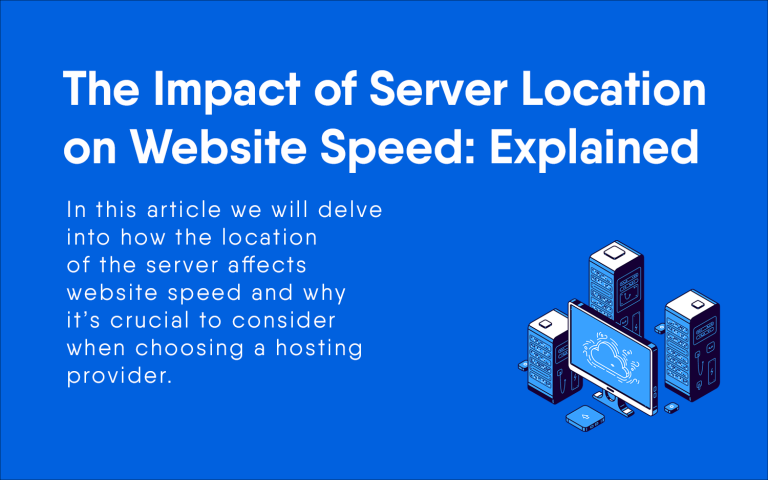Web Hosting vs Web Server: Understanding the Key Differences
Web hosting and web servers are often used interchangeably. They have meanings. While both play roles in website management they serve purposes. Understanding the differences, between web hosting and an Web server is vital for individuals and groups who are either planning to construct a website or migrate a present one.

Web web hosting refers to a carrier that lets human beings and groups make their websites available to the public through the net. Web web hosting providers offer services that include storage space, bandwidth and protection functions. These offerings make sure that websites can be accessed fast and securely from everywhere, within the international. On the hand an web server is a laptop software designed to supply requested internet pages to customers. It handles processing requests retrieving data and sending it back to the users browser.
The key distinctions lie in their functions and resources provided. While a web server focuses on delivering web pages a web host offers infrastructure. Support necessary for website maintenance. Understanding these differences is vital for anyone, in creating or migrating a website to a platform.
Understanding Web Hosting

Web hosting is a service that allows individuals and organizations to make their websites or web applications available, on the Internet. It provides the infrastructure and resources to store and deliver websites making them accessible to users.
There are types of web hosting services, which include shared hosting, cloud website hosting, VPS web hosting, and devoted website hosting. Each type has its benefits and drawbacks. The desire relies upon the particular requirements of the internet site.
Shared Hosting
Shared hosting is a type of web hosting service where multiple websites share server resources like CPU power, RAM and disk space. It’s a cost option for small websites with moderate traffic.
Cloud Hosting
Cloud hosting utilizes a network of servers to host websites. It offers scalability, reliability and flexibility making it a popular choice, for high traffic websites.
VPS Hosting
VPS hosting provides each website with its private server. This means that each website has dedicated resources including CPU power, RAM and disk space.
VPS hosting offers control and flexibility compared to shared hosting making it a suitable option, for websites that receive moderate levels of traffic.
Dedicated Hosting
Dedicated hosting is a type of hosting service that assigns a server to each website. It provides a level of control, security and performance making it an excellent choice for websites with traffic.
WordPress Hosting
WordPress hosting is specifically designed for WordPress websites. It comes with features like updates, backups and enhanced security measures making it an ideal choice for those using WordPress.
In general web hosting is a service for individuals looking to publish their websites or web applications. The selection of a hosting service depends on the requirements of the website and there are various types of hosting services available to cater to these needs.
Understanding Web Servers

A web server is a software application for receiving and processing client requests over the Internet. It stores, handles and delivers web pages when requested by users. A web server can be either a hardware device or a software program installed on either virtual server.
Web servers play a role, in managing HTTP requests and responses the building blocks of the World Wide Web.
When a user enters a website address into their web browser the browser sends a request, to the server that hosts the webpage associated with that address. The server then handles the request. Sends back the requested webpage to the users browser.
In addition to web servers there are types of servers that can work together to provide functionality. These include database servers, file servers and print servers. Database servers are used for storing and managing amounts of data while file servers help in storing and sharing files across a network. Print servers are responsible for managing printers and print jobs.
Web servers can be managed in ways; physically handling the server hardware using virtualization software to manage virtual servers on one physical server or utilizing cloud based hosting services for remote server management.
To sum it up web servers play a role in enabling users access to web pages upon request, within the World Wide Web. They can be either hardware devices or software programs installed on virtual servers with management options available based on users and organizations specific requirements.
| Web Hosting | Web Server |
| Provides storage space on a server for websites | Processes and delivers web pages to users |
| Hosts multiple websites on a single server | Can be a hardware device or software program installed on a server |
| Offers various plans with different features and resources | Can be managed in a variety of ways, including physically managing the server hardware, using virtualization software, or using a cloud-based hosting service |
| Provides technical support and maintenance services | Can be used in conjunction with other servers, such as database servers, file servers, and print servers |
Key Differences Between Web Hosting and Web Server

Web hosting and web servers are two components of a website each playing roles, with different functionalities. In this section we will outline the variations between web hosting and web servers.
Definition
A web server is an application that processes and delivers web pages upon receiving requests from users. On the hand web hosting is a service that provides the infrastructure and resources for storing and serving websites.
Function
The primary function of a web server is to handle user requests for web page processing and deliver them accordingly. Conversely the core purpose of web hosting is to offer storage space and bandwidth to website owners for storing their website files and ensuring accessibility for users.
Resources
For a web server to operate effectively it requires either a virtual server. In contrast with regard to web hosting services they provide space where website owners can store their website files.
Cost
Setting up and maintaining a web server can be expensive. However when it comes to web hosting services they generally offer options with various pricing plans tailored to different budgets.
Security
Web servers necessitate security measures in order to safeguard against cyber threats. Conversely in the case of web hosting services they provide security features, like SSL certificates and firewalls aimed at protecting website owners data.
Uptime and Reliability
To keep websites up and running smoothly it is crucial to maintain web servers. Web hosting services on the hand provide assurances of uptime. Offer customer support to optimize the online presence of website owners.
Customer Support and Money-Back Guarantee
Web hosting services prioritize customer satisfaction by providing reliable customer support and offering a money back guarantee. In contrast web servers typically do not include these features.
In summary while both a web server and a web hosting service play roles in maintaining a website they have functions and requirements. When making a choice, between the two options website owners should carefully consider their needs and budget constraints.
| Web Hosting | Web Server |
| Provides storage space and bandwidth for website owners | Processes and delivers web pages based on users’ requests |
| Offers a range of pricing options to fit different budgets | Can be expensive to set up and maintain |
| Offers security measures such as SSL certificates and firewalls | Requires specific security measures to protect against cyber threats |
| Offers uptime guarantees and customer support | Needs to be maintained to ensure uptime and reliability |
| Offers customer support and money-back guarantees | Does not typically offer customer support or money-back guarantees |
Web Hosting Types and Their Features

Web hosting refers to the provision of storage space. Bandwidth, for individuals or businesses who own websites. It involves processing and delivering web pages based on user requests. Different pricing options are available to cater to budget requirements although it can be costly to establish and maintain. Security measures such as SSL certificates and firewalls are implemented to safeguard against cyber threats. Regular maintenance is necessary to ensure uptime and reliability although customer support and money back guarantees are not typically offered.
Shared Hosting
There are types of web hosting services each with its distinctive features. One common type is shared hosting, where multiple websites share a server. This option is affordable and straightforward to set up making it suitable for businesses or individuals on budgets. However due to resource sharing it may not be ideal for high traffic websites.
Cloud Hosting
Cloud hosting utilizes a network of servers, for website hosting purposes. There are options when it comes to web hosting each, with its distinct advantages. One such option is cloud hosting, which provides scalability to easily manage traffic spikes and ensures uptime and reliability making it a popular choice for businesses seeking a dependable online presence.
VPS Hosting
Another option is VPS hosting, also known as Virtual Private Server hosting. This type of hosting offers dedicated space on a server providing power, flexibility and control compared to shared hosting. Users can install their software. Have root access to their virtual space.
Dedicated Hosting
For those seeking top notch performance and ample resources dedicated hosting is a choice. With hosting a website resides on its own server. Although it may be pricier than shared hosting the benefits include increased resources and superior performance making it suitable for websites with traffic or resource applications.
WordPress Hosting
If you’re using WordPress as your content management system (CMS) WordPress specific hosting is worth considering. It is optimized for WordPress websites. Comes with features like updates, pre installed plugins and enhanced security measures—making it an excellent choice, for businesses or individuals relying on WordPress.
To sum up there are types of web hosting today each offering unique features catering to different needs and preferences.
When considering which hosting provider to choose it’s important to take into account factors such, as reliability, uptime, customer support and pricing. By selecting the hosting service both businesses and individuals can ensure that their website is secure, dependable and tailored to their needs.
Role of Web Servers in Web Hosting
The role of web servers in web hosting is crucial. Web servers are software programs that process and deliver web pages based on user requests. They handle the delivery of content like HTML documents, images, and videos well as dynamic content like web applications and scripts.
When a user enters a site name or URL into their browser the browser sends a request to the web server that hosts the website. The web server then responds with the aid of sending back the requested content material to be displayed in the users browser. This manner is commonly called serving an internet web page.
Web servers may be configured to deal with types of requests and serve varieties of content material. For instance an HTTP server is designed mainly for coping with requests related to net pages while a database server focuses on handling requests for database statistics.
In the realm of web hosting a typical setup involves hosting a web server either on hardware or, within an environment.
The server hardware plays a role, in ensuring websites have the resources for storage and accessibility. These resources include storage space, processing power and bandwidth.
Web hosting providers offer types of hosting services that cater to needs. These services include shared hosting, cloud hosting, VPS hosting and dedicated hosting. Each type has its advantages and disadvantages depending on what the website owner requires.
For instance shared hosting is a cost option that allows multiple websites to share server resources. On the hand cloud hosting provides scalability and reliability by utilizing a network of servers to host websites.
Furthermore web servers can do more than host web pages they can also serve as hosts for web services and APIs. These services enable developers to create web applications that interact with applications and data sources.
All web servers are a part of web hosting as they handle requests, serve web pages and provide the necessary resources for website storage and accessibility. By understanding the role of web servers in web hosting website owners can make decisions when choosing the hosting solution, for their specific needs.
Conclusion
To conclude deciding between web hosting options or using web servers depends on the requirements of each website owner.
Web hosting offers a user friendly option, for those who don’t require control over their server environment. On the hand a web server provides flexibility in terms of security and customization but it comes with a higher cost and requires technical expertise to manage.
In summary here’s a quick comparison between web hosting and web servers:
| Feature | Web Hosting | Web Server |
| Control | Basic security measures provided by the hosting provider | Limited control over the server environment |
| Security | Basic security measures provided by hosting provider | Ability to implement stricter security measures |
| Cost | Generally more cost-effective | Higher cost |
| Technical Expertise | Minimal technical expertise required | Technical expertise required to manage server |
| Customization | Limited customization options | Ability to fully customize server environment |
Ultimately the decision among net hosting and net servers ought to be primarily based on the desires and desires of the internet site owner. Factors such, as manipulation, protection, fee, technical information and customization should be carefully considered to determine that satisfactory fits their necessities.

Faisal Rafique
I’m an accomplished entrepreneur and content creator with a strong background in technology and software engineering. My expertise spans web development, eCommerce, programming, hosting management, technical support, and data science. I hold a Master’s Degree in Computer Science and Engineering, and I have over 5 years of professional experience, which I leverage to grow my digital business and popular blog, FaisalRafique.com




